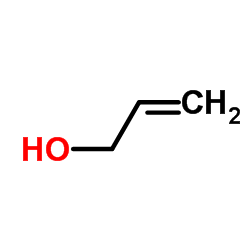1428-33-7
| Name | 3-(1,1,2,2-tetrafluoroethoxy)prop-1-ene |
|---|---|
| Synonyms |
2H-Perfluoroethyl allyl ether
1,1,2,2-tetrafluoroethyl allyl ether EINECS 215-847-3 HCF2CF2OCH2CH=CH2 1,1,2,2-tetrafluoro-1-prop-2-enyloxyethane MFCD00043822 |
| Density | 1.173g/cm3 |
|---|---|
| Boiling Point | 77.4ºC at 760mmHg |
| Molecular Formula | C5H6F4O |
| Molecular Weight | 158.09400 |
| Flash Point | -5°C |
| Exact Mass | 158.03500 |
| PSA | 9.23000 |
| LogP | 2.04690 |
| Vapour Pressure | 107mmHg at 25°C |
| Index of Refraction | 1.328 |
Synonym:Non Section 2 - COMPOSITION, INFORMATION ON INGREDIENTS
Risk Phrases: 36/37/38 Section 3 - HAZARDS IDENTIFICATION EMERGENCY OVERVIEW
Irritating to eyes, respiratory system and skin.The toxicological properties of this material have not been fully investigated. Potential Health Effects Eye: May cause eye irritation. Skin: May cause skin irritation. Ingestion: The toxicological properties of this substance have not been fully investigated. May be harmful if swallowed. Inhalation: The toxicological properties of this substance have not been fully investigated. May be harmful if inhaled. Chronic: No information found. Section 4 - FIRST AID MEASURES Eyes: Flush eyes with plenty of water for at least 15 minutes, occasionally lifting the upper and lower lids. Get medical aid immediately. Skin: Get medical aid immediately. Flush skin with plenty of soap and water for at least 15 minutes while removing contaminated clothing and shoes. Ingestion: If victim is conscious and alert, give 2-4 cupfuls of milk or water. Get medical aid immediately. Inhalation: Get medical aid immediately. Remove from exposure to fresh air immediately. If not breathing, give artificial respiration. If breathing is difficult, give oxygen. Notes to Physician: Treat symptomatically. Section 5 - FIRE FIGHTING MEASURES General Information: As in any fire, wear a self-contained breathing apparatus in pressure-demand, MSHA/NIOSH (approved or equivalent), and full protective gear. Extinguishing Media: Use dry sand or earth to smother fire. Use water spray to cool fire-exposed containers. Autoignition Temperature: Not available. Flash Point: Not available. NFPA Rating: Not published. Explosion Limits, Lower: Not available. Upper: Not available. Section 6 - ACCIDENTAL RELEASE MEASURES General Information: Use proper personal protective equipment as indicated in Section 8. Spills/Leaks: Absorb spill with inert material, (e.g., dry sand or earth), then place into a chemical waste container. Section 7 - HANDLING and STORAGE Handling: Wash thoroughly after handling. Remove contaminated clothing and wash before reuse. Avoid contact with skin and eyes. Avoid ingestion and inhalation. Use only in a chemical fume hood. Storage: Keep away from heat, sparks, and flame. Store in a cool, dry place. Section 8 - EXPOSURE CONTROLS, PERSONAL PROTECTION Engineering Controls: Use adequate general or local, explosion-proof ventilation to keep airborne levels to acceptable levels. Personal Protective Equipment Eyes: Wear appropriate protective eyeglasses or chemical safety goggles as described by OSHA's eye and face protection regulations in 29 CFR 1910.133. Skin: Wear appropriate protective gloves to prevent skin exposure. Clothing: Wear appropriate protective clothing to prevent skin exposure. Respirators: Follow the OSHA respirator regulations found in 29CFR 1910.134. Always use a NIOSH-approved respirator when necessary. Section 9 - PHYSICAL AND CHEMICAL PROPERTIES Physical State: Not available. Appearance: Not available. Odor: Not available. pH: Not available. Vapor Pressure: Not available. Vapor Density: Not available. Evaporation Rate: Not available. Viscosity: Not available. Boiling Point: Not available. Freezing/Melting Point: Not available. Decomposition Temperature: Not available. Solubility: Not available. Specific Gravity/Density: Not available. Molecular Formula: Not available. Molecular Weight: Not available. Section 10 - STABILITY AND REACTIVITY Chemical Stability: Has not been fully evaluated. Conditions to Avoid: Light, excess heat. Incompatibilities with Other Materials: Oxidizing agents. Hazardous Decomposition Products: Carbon monoxide, carbon dioxide. Hazardous Polymerization: Has not been reported Section 11 - TOXICOLOGICAL INFORMATION RTECS#: CAS# 1428-33-7 unlisted. LD50/LC50: Not available. Carcinogenicity: Allyl 1,1,2,2-Tetrafluoroethyl ether - Not listed by ACGIH, IARC, NIOSH, NTP, or OSHA. See actual entry in RTECS for complete information. Section 12 - ECOLOGICAL INFORMATION For further information, contact Fisher Scientific. Section 13 - DISPOSAL CONSIDERATIONS Dispose of in a manner consistent with federal, state, and local regulations. Section 14 - TRANSPORT INFORMATION CDG/CPL IMO Not regulated as a hazardous material. IATA Not regulated as a hazardous material. RID/ADR Not regulated as a hazardous material. Canadian TDG No information available. Section 15 - REGULATORY INFORMATION European/International Regulations European Labeling in Accordance with EC Directives Hazard Symbols: XI Risk Phrases: R 36/37/38 Irritating to eyes, respiratory system and skin. Safety Phrases: WGK (Water Danger/Protection) CAS# 1428-33-7: Canada None of the chemicals in this product are listed on the DSL/NDSL list. WHMIS: Not available. CAS# 1428-33-7 is not listed on Canada's Ingredient Disclosure List. Exposure Limits US FEDERAL TSCA CAS# 1428-33-7 is not listed on the TSCA inventory. It is for research and development use only. SECTION 16 - ADDITIONAL INFORMATION N/A |
| Hazard Codes | F,Xn |
|---|---|
| Risk Phrases | R11;R20/22 |
| Safety Phrases | S16-S23-S33 |
| RIDADR | UN 3271 |
| Packaging Group | II |
| Hazard Class | 3.1 |
| HS Code | 2909199090 |
|
~% 
1428-33-7 |
| Literature: Doklady Akademii Nauk SSSR, , vol. 121, p. 307,309 Doklady Chemistry, 118-123<1958>541,543 |
| Precursor 2 | |
|---|---|
| DownStream 3 | |
| HS Code | 2909199090 |
|---|---|
| Summary | 2909199090. other acyclic ethers and their halogenated, sulphonated, nitrated or nitrosated derivatives. VAT:17.0%. Tax rebate rate:13.0%. . MFN tariff:5.5%. General tariff:30.0% |



![dichloro-phenyl-[3-(1,1,2,2-tetrafluoroethoxy)propyl]silane structure](https://image.chemsrc.com/caspic/319/731-21-5.png)
![trichloro[3-(1,1,2,2-tetrafluoroethoxy)propyl]silane structure](https://image.chemsrc.com/caspic/398/756-76-3.png)